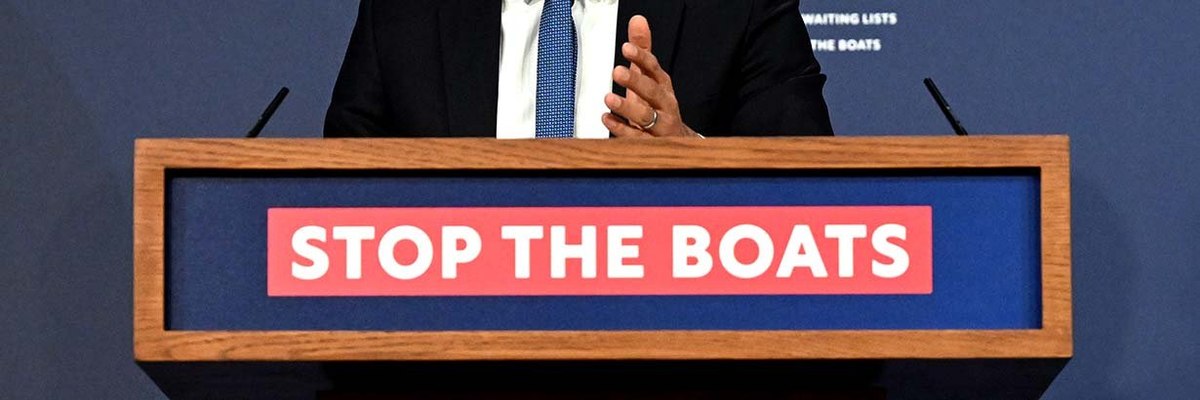YouGov deep-dive analysis in the Red and Blue Walls shows how focusing on immigration holds much risk and uncertain reward for Sunak’s Conservatives
Immigration has once again become a top political discussion topic. The government have turned dealing the with issue of small boats of migrants and refugees arriving over the English Channel into a key pledge – a “people’s priority” – as we close in on a probable general election next year.
Among the public, immigration and asylum is now being picked by 35% of respondents in YouGov’s ‘most important issues’ tracker, and has firmly supplanted the environment and climate change in third place.
Arguments have gone back and forth as to the extent to which campaigning on an issue which only 10% of the public believe the government is handling well is a fruitful cause for Sunak and his party.
Much of this debate has focused on how well the government’s focus on immigration and asylum – or, more specifically, the issue of small boats, will “go down in the Red Wall”. This legion of once Labour stronghold constituencies has become a fascination for political commentators, pollsters, and strategists since Boris Johnson’s blue tide swept over them in 2019.
Having strongly backed Brexit in 2016 (according to Professor Chris Hanretty’s estimates), the argument goes that an immigration-based campaign could help the Conservatives hold on to some of those voters who switched over to the party in 2019 and delivered Johnson that thumping 80-seat majority.
But to what extent is this supported by the data? Does immigration register as more of a concern in the Red Wall than elsewhere? Do voters there trust the Conservatives on the issue more so than Labour?
Elsewhere, in the South of the country lie another group of Conservative-held constituencies with a very different political profile – the Blue Wall. Stretching from the South West to the East of England and down to the South Coast, these constituencies voted Remain in 2016 and have a higher than average concentration of highly educated (degree-holding) voters.
With the Liberal Democrats and Labour breathing hard down Conservative necks here, could an immigration-focused campaign end up costing Sunak as many seats in England’s South as he protects in North?
New analysis of YouGov data collected throughout January and February explores how much of a political weapon the issue of immigration could potentially be to the Conservatives in these two key battleground areas.
What we find is that while immigration is certainly a concern for many of the exact types of voters the Conservatives are trying to move back into their column ahead of the next general election, concern over the economy is consistently the number one issue across the political battlefield. Further still, among those across the Red Wall and Blue Wall who do place immigration in their top priorities, there is very little faith in the Conservatives to deliver on it.
As such, even if the Conservatives were able to score a victory on immigration and asylum, a Labour advantage on the issue of the economy would seem far more significant.
For which Tory target groups is immigration and asylum a major issue?
Repeating the wording from our long-running, weekly, ‘most important issues’ tracker, we asked over 36,000 Britons to pick up to three issues they saw as the most important topics facing the country at the time, with fieldwork ranging from 2 January to 26 February. Across this mega-sample, the top figures were 65% for the economy, 52% for health, 28% for immigration and asylum, and 22% for the environment.
In our representative sample of 2,675 Red Wall residents, immigration comes in at 32% – four points higher than in the country as a whole. As with the national list, the economy tops the scale at 65%, and health comes in second at 49%. The environment sits back on 18%, level with crime (itself slightly higher in the Red Wall than the 14% nationwide). So, while there is a notable difference in immigration concern in the Red Wall, this particular political battleground looks much like Britain as whole.
The picture in the Blue Wall is slightly different. Here, 25% put immigration and asylum in their top three issues – three points lower than the country as a whole. Two-thirds (67%) picked the economy, while 55% put health. The environment is slightly more of a concern in the Blue Wall, at 26%, achieving effective parity with immigration and asylum.
Of course, a strong campaign focus on immigration may play out better with – and may draw more attention from – certain important groups of voters within each political battlefield whom the Conservatives would be particularly reliant upon to defend their majority.
And it proves to be the case that immigration is a more important issue among key Conservative target groups.
Those voters who backed the Conservatives in 2019, but are currently unsure who to vote for, are particularly likely to say that immigration and asylum is a key issue, at 43%. Such voters in the Red Wall specifically are even more likely to say so, at 51%, and in the Blue Wall those unsure about backing the Tories again are 12 points more likely than Blue Wall residents in general to see immigration as a top issue, at 37%.
Likewise, another key voting group that the Tories will seek to retain – 2017 Labour voters who backed the Conservatives in 2019 – are also more likely than the wider country to see immigration as a top issue. Around four in ten of these Labour switchers nationally (39%) see it as a main concern, versus 28% of all Britons. The same applies in the Red Wall, where Labour-to-Conservative 2019 switchers are again more likely to say so than the wider Red Wall population (43% vs 32%)
By contrast, those 2019 Conservative voters who now say they will back Labour are not noticeably more concerned about immigration and asylum than the wider public: this figure stands at 30% among this voting group nationally, as well as in the Red Wall, and falls to just 23% in the Blue Wall.
It is also worth noting that the economy is a significantly bigger issue across every voter group in this analysis, and the same is true of health (except for Red Wall Tory ‘unsures’ and Red Wall Labour switchers).
Furthermore, even among those Red Wallers who place immigration in their top three concerns, 59% also pick the economy as a top issue (32% also pick health). That economy figure is just 6 points shy of the Red Wall total (65%).
Again, this highlights how central the economy is as a political issue across all voter groups – and how it currently offers a much more substantial prize for parties trying to capture support across English political battlegrounds.
The Conservatives are widely distrusted on immigration
While immigration is clearly high on the agenda among many voter groups crucial to any defence of the Tories’ 2019 majority, they must contend with the fact that they have lost their status as the party most trusted to tackle the issue to Labour.
Nationally, net trust in the Conservatives to handle immigration stands at a dire -59, with Labour on a comparatively less bad -29. According to our latest tracking data, just 17% of the public think the Conservatives would do a better job at handling immigration and asylum than Labour (21% think Labour would do better).
The results in the Red and Blue Walls are similar. In the old Labour heartlands across the North, Midlands, and Wales, net trust for the Conservatives on immigration is at -54 compared to Labour’s -30. In the Remain-voting ‘true blue’ South, the figures are -53 and -28 respectively.
Worse still, even among those voters who backed the Conservatives in 2019 on a pro-Brexit platform, trust in them to deal with immigration is below that of the opposition Labour: among 2017 Labour switchers nationally the Tories score -54 to Labour’s -42.
Those 2019 Tories who have since defected to Labour seem to be long-lost on this issue: net trust in the Conservatives stands at -72 to Labour’s -6 nationwide. In the Red Wall, Labour lead the Conservatives among this group by -7 to -75, with similar figures in the Blue Wall (-1 to -76).
There is a glimmer of hope for the Tories in that other key groups do still tend to distrust them less than their Labour rivals. Those 2019 Conservative voters – be they nationwide, or in the Red or Blue Walls – who are currently unsure how to vote all tend to have less unfavourable levels of trust in the Tories (-56 to -65) to tackle immigration than Labour (-74 to -85).
Implications for 2024
What does all this mean for a potential electoral strategy for the Conservatives moving into 2024? It certainly implies that drawing attention to an issue where we certainly detect more concern among some key groups to the Conservative voter coalition, but find very low levels of faith in the Conservatives to deal with, is a high risk strategy.
The economy, and to a lesser extent health, dominate the average voters’ minds in every political battleground. Inability to convince the public on either would seem fatal to the Conservative chances of re-election. However, among some voters whom the Conservatives are particularly keen on capturing or recapturing – and particularly so in the Red Wall – there is strong concern around immigration which could be effectively tapped into.
There does also seem to be a small silver lining for the Conservatives in that among some of those key voter groups that voters still potentially might trust them to a greater degree on immigration than they do Labour – although the bar there is exceptionally low.
For instance, the oft-discussed “Conservative in 2019, don’t know now” group would seem to be particularly more open to arguments and campaigns around immigration – especially in the Red Wall. They look incredibly similar to those who are still sticking with the Conservatives in terms of their thoughts on most important issues, but are far, far less trusting of the Conservatives to handle the issue of immigration.
The story in the Blue Wall is much more complicated for Sunak. Among those who have drifted away from the Conservatives there, concern over immigration is far lower than it is among their counterparts in the Red Wall.
There are far fewer marginals in the Blue Wall than the Red Wall, and so Sunak and the Conservatives may feel they can afford to leak a significant number of votes in the South in the cause of maintaining support in the North. That said, a campaign focused on issues which register significantly lower in their own heartlands than their newly gotten gains risks accelerating the electoral consequences of socio-demographic and geopolitical trends against the Conservatives across the South of England.
Furthermore, even among those for whom immigration is an important issue, the economy still dominates the picture. Even if the Conservatives were able to win over voters on the issue of immigration, a Labour victory on the economy would seem to be a far more consequential prize to the electoral outcome.
See the full national results here; the Red Wall results here; and the Blue Wall results here
Photo: Getty








